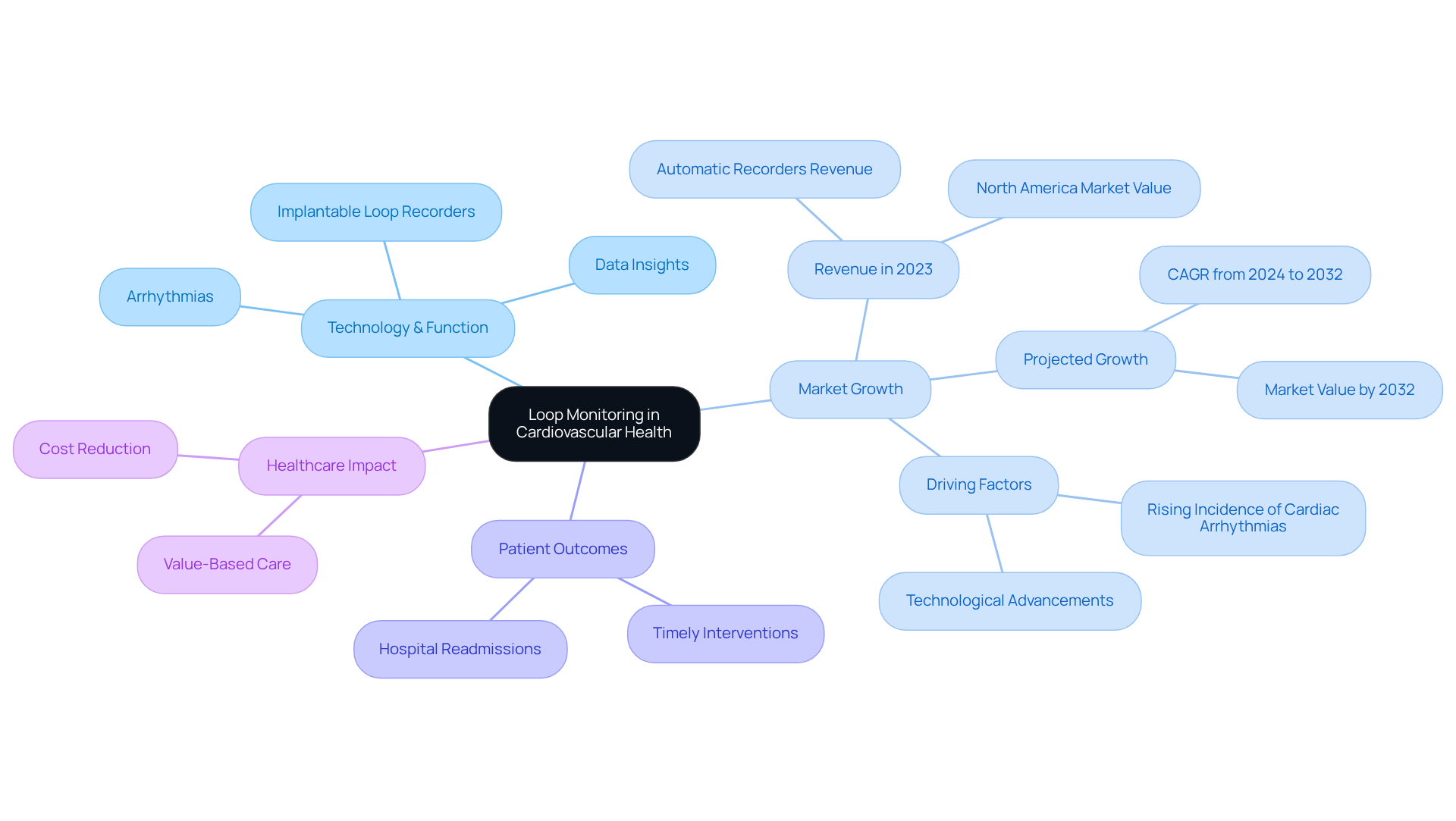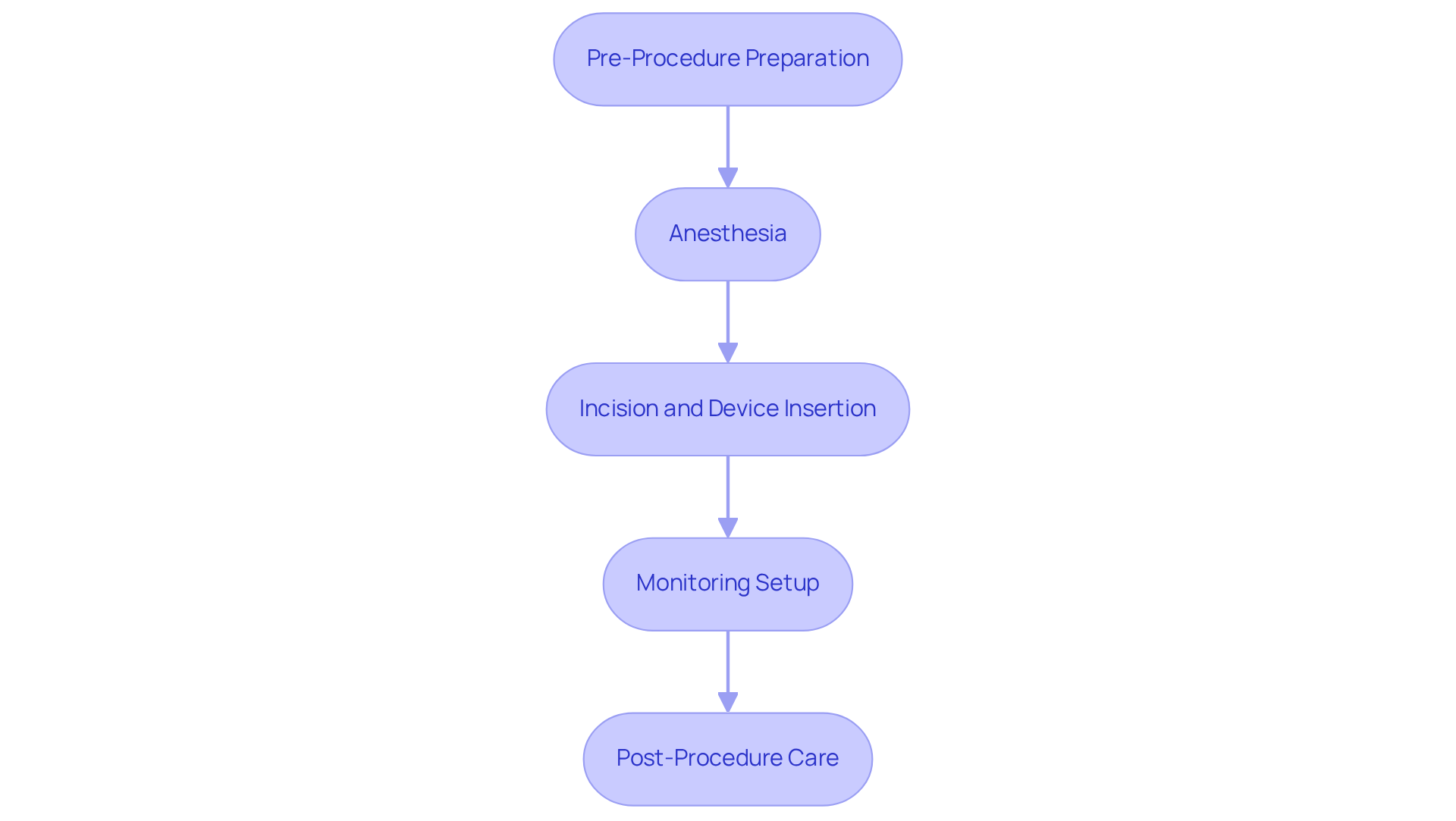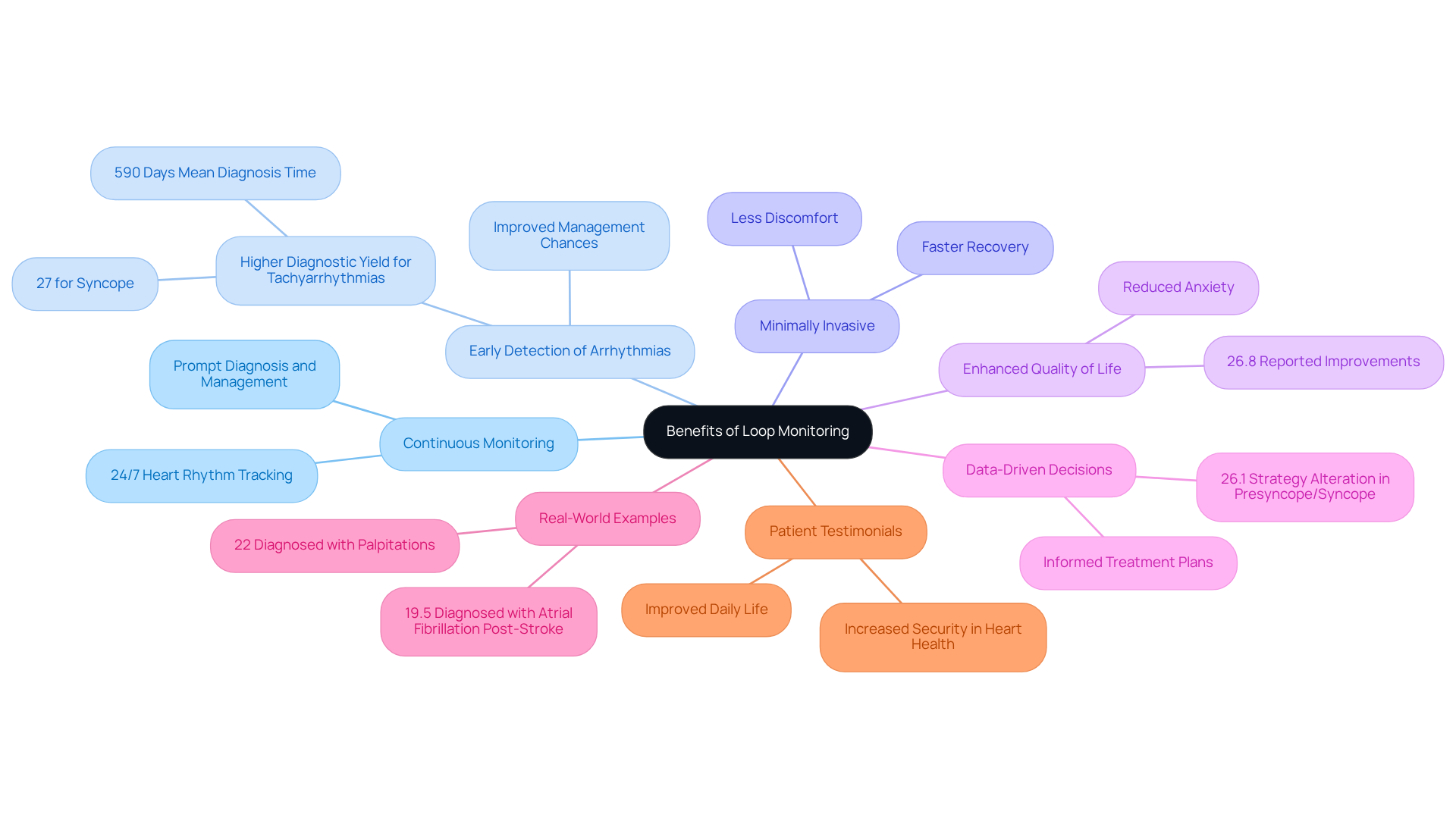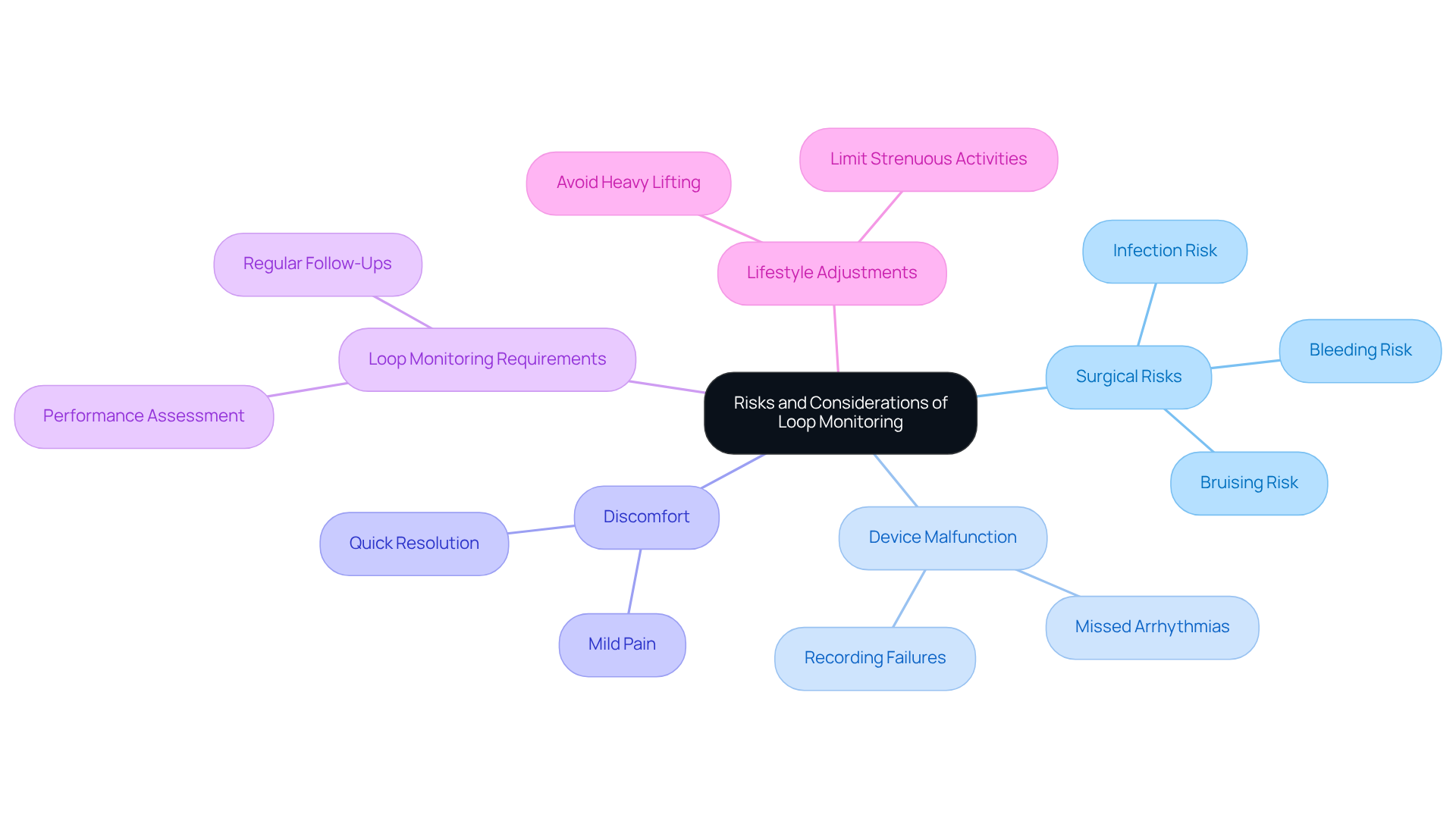


Loop monitoring, through the use of an implantable loop recorder (ILR), is essential for keeping track of heart rhythms and diagnosing arrhythmias. This technology significantly enhances the management of cardiovascular health, offering you peace of mind. Continuous data collection from ILRs allows for early detection of irregular heartbeats, which leads to timely interventions and better patient outcomes. This proactive approach to cardiac care is designed to support your health and well-being.
Have you ever felt uncertain about your heart health? It's completely understandable. The ability to monitor your heart rhythm continuously means that any irregularities can be caught early, allowing for prompt action when necessary. This not only helps in managing your condition but also reassures you that your health is being closely watched. In addition to this, knowing that there are solutions available can empower you to take charge of your health journey.
Every heartbeat matters, and with ILRs, we can ensure that you receive the care you need when you need it most. If you have concerns about your heart health, don’t hesitate to reach out for support. We are here to help you navigate your health with compassion and understanding.
Loop monitoring represents a significant advancement in cardiovascular care, offering patients a proactive approach to managing their heart health through continuous tracking of electrical activity. This innovative technology, especially with the integration of devices like the implantable loop recorder, empowers healthcare providers to diagnose and treat arrhythmias more effectively, leading to improved patient outcomes. However, as with any medical procedure, the journey of loop monitoring raises important questions about its risks, benefits, and the overall impact on quality of life. How can patients navigate these complexities to ensure they receive the best possible care?
In addition to this, it's essential to recognize that understanding these aspects can lead to more informed decisions. By exploring the advantages of loop monitoring, patients can feel more confident about their heart health management. Furthermore, having open discussions with healthcare providers can alleviate concerns and provide clarity on the process. Remember, you are not alone in this journey; support is available to help you make the best choices for your well-being.
Loop monitoring is a compassionate approach that entails the continuous documentation of the heart's electrical activity using an implantable loop recorder (ILR). This small device, gently placed beneath the skin of the chest, plays a vital role in for up to three years. It provides essential insights into arrhythmias—irregular heartbeats that can lead to serious risks like stroke or cardiac failure. By capturing extensive data over time, healthcare providers can identify patterns and triggers associated with these irregularities, which helps in making more precise diagnoses and developing personalized treatment strategies, especially for those experiencing intermittent symptoms that standard tests might overlook.
Recent advancements in ILR technology, particularly those integrated with Amavita's CardioElite™, have significantly improved diagnostic accuracy, especially through the use of loop monitoring to predict and prevent cardiovascular complications. The automatic recorders segment generated approximately USD 958.6 million in revenue in 2023, reflecting a growing preference for devices that continuously monitor heart activity and detect asymptomatic arrhythmias. Research indicates that individuals using ILRs often experience enhanced outcomes, with many benefiting from timely interventions based on the data gathered. This is crucial in reducing hospital readmissions and improving overall care, ensuring that patients feel supported throughout their health journey.
The global market for implantable loop recorders was estimated at approximately USD 1.4 billion in 2023 and is expected to exceed USD 2.9 billion by 2032. This growth is driven by the rising incidence of cardiac arrhythmias and the increasing need for loop monitoring solutions. As cardiologists emphasize, the ability of ILRs to provide comprehensive insights into cardiac rhythm patterns is essential for effective treatment planning. This shift towards value-based care highlights the importance of incorporating ILRs into comprehensive care management strategies, ultimately enhancing outcomes for individuals and helping to lower healthcare expenses. Together, we can navigate these challenges, ensuring that every patient receives the attentive care they deserve.

At Amavita Vascular Health®, our loop monitoring system is designed with your comfort in mind, ensuring efficient cardiovascular care. We are dedicated to providing innovative cardiac care that addresses your needs. Here’s an overview of the key steps involved in the process:
We are proud to report that patient satisfaction levels with loop monitoring at Amavita are significantly high. Many individuals express that their quality of life has improved due to successful diagnosis and management of their heart conditions with the help of loop monitoring. Our healthcare professionals emphasize the importance of thorough preparation and clear communication throughout the process. As one cardiologist noted, 'Loop recorder implantation is viewed as a minor operation, but adequate preparation of the individual is essential for success.' Real-life instances show that individuals often bring a checklist to ensure they are prepared, contributing to a smoother experience and better outcomes.
While the procedure is generally safe, it’s important to consider , such as bleeding and infection, within the context of the overwhelmingly positive results associated with the procedure. Furthermore, you have the ability to manually transmit information by pressing a button if you encounter symptoms, enhancing your involvement in tracking your cardiovascular well-being. We are here to support you every step of the way, ensuring you feel valued and cared for.

Loop monitoring provides several key benefits for patients, particularly in the context of Amavita's CardioElite™ program, which emphasizes comprehensive management and the reduction of readmissions.

While loop monitoring is generally safe, we understand that there are some risks and considerations you may want to keep in mind:
We are committed to walking this journey with you, providing the support and understanding you need every step of the way.

Loop monitoring represents a significant advancement in cardiovascular care, offering patients a proactive approach to managing their heart health. By utilizing implantable loop recorders (ILRs), healthcare providers can continuously track heart rhythms and identify irregularities that may otherwise go unnoticed. This technology not only enhances diagnostic accuracy but also plays a crucial role in the timely intervention and personalized treatment of patients experiencing arrhythmias.
In addition to this, the article delves into the various aspects of loop monitoring, outlining its procedure, the benefits it offers, and the considerations patients should keep in mind. Key points include:
Furthermore, the discussion highlights the growing market for loop monitoring solutions, emphasizing the increasing recognition of their importance in comprehensive cardiac care.
Ultimately, loop monitoring serves as a vital tool in the landscape of cardiovascular health, empowering patients and healthcare providers alike. As the prevalence of cardiac arrhythmias rises, embracing technologies like ILRs can lead to better patient outcomes and enhanced quality of life. It is essential for individuals to consider the benefits and risks associated with loop monitoring, ensuring informed decisions that align with their health goals. Engaging with healthcare professionals and exploring options for loop monitoring can pave the way for a more proactive and supportive approach to heart health management. Remember, you are not alone on this journey; support is available every step of the way.
What is loop monitoring?
Loop monitoring is a technique that involves the continuous documentation of the heart's electrical activity using an implantable loop recorder (ILR), which is a small device placed beneath the skin of the chest.
How long can an implantable loop recorder monitor heart rhythms?
An implantable loop recorder can monitor heart rhythms for up to three years.
What conditions can loop monitoring help identify?
Loop monitoring helps identify arrhythmias, which are irregular heartbeats that can lead to serious risks such as stroke or cardiac failure.
How does loop monitoring improve diagnosis and treatment?
By capturing extensive data over time, healthcare providers can identify patterns and triggers associated with arrhythmias, leading to more precise diagnoses and personalized treatment strategies, especially for patients with intermittent symptoms.
What advancements have been made in ILR technology?
Recent advancements, particularly those integrated with Amavita's CardioElite™, have improved diagnostic accuracy and the ability to predict and prevent cardiovascular complications.
What was the revenue generated by automatic recorders in 2023?
The automatic recorders segment generated approximately USD 958.6 million in revenue in 2023.
What is the projected growth of the global market for implantable loop recorders?
The global market for implantable loop recorders was estimated at approximately USD 1.4 billion in 2023 and is expected to exceed USD 2.9 billion by 2032.
What factors are driving the growth of loop monitoring solutions?
The growth is driven by the rising incidence of cardiac arrhythmias and the increasing need for loop monitoring solutions.
How do ILRs contribute to patient care?
ILRs provide comprehensive insights into cardiac rhythm patterns, which are essential for effective treatment planning, reducing hospital readmissions, and improving overall care.
What is the significance of incorporating ILRs into care management strategies?
Incorporating ILRs into comprehensive care management strategies enhances outcomes for individuals and helps lower healthcare expenses, aligning with the shift towards value-based care.